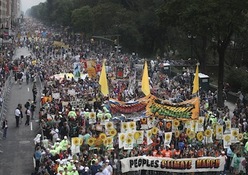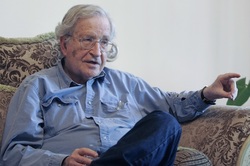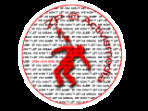By - Darren Fleet
I thrust my hand into the dark earth …
and curl my fingers into a loose fist around a clump of soil. The rays of sun above me filter through the coverage of a heritage magnolia tree, its canopy blocking half of the potato bed below. In the wet days of spring the magnolia’s clumpy red roses, the size of tennis balls, blanketed the backyard for weeks. I’ve spent hours, if not days in total, tolerating this one tree alone, religiously clearing the wilting red petals while tiptoeing around the young seedlings the tree attempted to smother at my feet. Now that it’s July, the buds are mostly gone and the green foliage is thick along the scraggly chocolate-brown limbs. The light is still diffused in the branches, but the potatoes don’t seem to mind — their water-saturated stalks, with fuzzy green leaves, are two feet tall now. Months ago, my neighbor attempted to convince me to cut the magnolia down to save all of this extra work. I told him I wasn’t about to cut down a fifty-year-old tree for the sheer inconvenience of sweeping flowers — and now that I know how long it takes to grow one simple seed into a real edible thing, how could I? If there is a Zen to gardening it is this simple fact: it’s not about the food, it’s not about the politics, it’s not about the greater good, the health or the DIY collectives; it’s about recovering a piece of irrationality, living beyond the efficiency at the core of our civilization’s malaise.
Gardening is kind of a lame word. It invites images of leisurely grandmothers, flower print gloves and poor weekend fashion sense. And urban farming, though more correctly descriptive, doesn’t seem to capture what I see happening in the yards and community garden plots around my neighborhood. Urban farming is a subversive activity, but only when it crosses the threshold from pastime to lifestyle. When that happens, something in you changes. Like the religious experiences of youth or the rapture of love, suddenly an entire realm of imagination opens up. You begin to pay more attention to the wind, the temperature and the sunshine. Everything becomes relational to the growing seeds, away from the ego, away from the self, away from the paradigm that puts you at the center of everything worthwhile. You start moving slower through the streets, eyeing scrap wood in the alleyways for potential plant beds. You examine rogue wild flowers for clippings. You tear apart scavenged pallets with an old claw hammer for boards to make a planter; you straighten out rusty bent nails to fasten it together even though one-and-a-half-inch spikes are a dollar a dozen at the Home Depot down the road. Rainy days become more bearable. The burning ball of fire in the sky has more meaning. You scorn the glass towers and give cheers to wild lawns and old houses deteriorating under the pressure of nature and time. You pay mournful homage to the sad irony that the best farmland in the world is now under concrete.
When I was a smoker, logic told me that that $8.00 for a pack of cigarettes was a good deal and $3.00 for a fistful of organic fair trade kale was a rip-off. This is the type of reasoning that happens when market mechanisms of value disable one’s ability to make sound physiological decisions — when the cost of a thing (exchange value) becomes the price tag on the thing, and not the thing itself (use value). The distorted process that leads to deadly price points between carcinogens and vegetables is alive in the mental environment as well. In the same way the market teaches us to value pesticides over blemishes, packaging over content and teeth-rotting sodas over water, modernity teaches us to value urban over rural, machines over minds, individuality over community and growth over contentment. This psychosis affects the fabric of our dreams, the careers we aspire to and the way we conceive of the land in our culture and our economy and its relation to ourselves. Accordingly, two of the saddest intuitive lessons we learn growing up in this part of the world are that food has no worth and that meals have no purpose other than sustenance. Today, food, even organic food, is expected to be cheap. Not surprisingly, North American food costs are the cheapest on the planet. Single serving dinners and fast-food restaurants dominate the eating culture. Agricultural workers are the lowest-paid workers throughout the vast continental food chain.
Even those who have nostalgic ideas about what it means to farm don’t really want to be farmers. When was the last time you met someone who actually wanted to grow corn, beets, beans or pumpkins? Have you ever met a college dropout in Toronto or New York or London who moved to the bald Canadian prairies to reap canola? And if you did, what did you honestly think of their aspirations? Were they lowbrow? Were they selling themselves short? Were they limiting their unique individual potential? Who among you wants to be up from dawn to dusk, at the mercy of earth’s natural systems, living on faith amongst secular technologies, covered in mud all the time, no time for art, music or self-expression? These questions might be rude, but they’re essential to ask in order to get to the heart of the contradictory relationship we have with farming in the modern age — it’s the most basic building block of our existence, but it isn’t valued.
Aspiring to be “only” a farmer, to work the land, has been the bane of modernity’s existence since development theorists first began spinning tales of how to get to the future. When exposed to the glitz of modernity, most people desperately try to escape the fields, leaving only Monsanto in the countryside. The mass-migrations to mega slum cities in sub-Saharan Africa, India and Latin America are a testament to the continuous pull of “opportunity.” As Daniel Quinn argues, even the earliest folks tales of Western civilization, like the Bible’s Cain and Abel, pit the entrepreneurial proto-urbanite against the satisfied herdsman, the latter murdered by his forward-looking bother — our first modern superstar. Modern humankind is urban. Nature is a place to visit. Reading early development texts like Daniel Lerner’s 1958 The Passing of Traditional Society, you learn that working the land, the primary occupation in “traditional society,” is to economic progress what religion once was to the enlightenment — backward, irrational, unimaginative, slow, old:
Traditional society is non-participant — it deploys people by kinship into communities isolated from each other and from a center; without an urban-rural division of labor, it develops few needs requiring economic interdependence; lacking the bonds of interdependence, people’s horizons are limited by locale and their decisions involve only other known people in known institutions.
Today in the industrialized world, with the exception of a fraction of the agricultural economy, there are no more farms, only factories. And communities are defined as groups of individuals, a hopeful oxymoron at best. The impact of this detachment from our agrarian roots is as ecological and social as it is psychological. Removed from our billions-of-years-old evolutionary environment in a matter of a few millennia (and in some cases centuries and even decades), the loss of natural interaction has turned into a banal impulse to destroy — that is, as ecologist Bill Rees says, to turn everything around us into ourselves. In religious terms, you could say we’ve gained the world but lost our souls. In secular terms, we’ve reached modernity, but lost our minds. Mental health is now the most debilitating medical condition in the United States, responsible for more lost work hours than any other affliction. Not far behind are the complications related to overeating — diabetes, heart failure, cancer, etc. Just a few months ago the FDA approved an “obesity pill,” a last-ditch attempt to tackle America’s 35% obesity rate. When we moved from the fields we stopped creating living things. This has affected us in ways we are only just beginning to understand. Our materiality is without a pulse. We spend most of our time killing and working with the dead. Our greatest minds cannot be satisfied with natural mysteries. In this paradigm, trees become paper, houses and fences. Fields become streets and parking lots. Minerals become steel and computers. Waterways become highways and trash bins. Animals and plants become food, fuel and commodities. The natural world has no intrinsic value other than efficiency, and the most efficient use invented so far is to mulch it into something else. And now we are waking up to the reality that our proudest human achievement, modernity, could be an evolutionary dead end. Without the ability or desire to go backward to some pre-modern utopia, how do we go forward without killing ourselves?
I did my first inner-city garden story in Vancouver in 2008 as part of a group assignment during journalism school. When someone suggested “Green Revolution” as a title, I wanted to gag. A quarter-acre of green space in a city of ever-increasing high-rises hardly qualifies as the coming environmental insurrection — and if it does we all really do have a lot to worry about. If there’s a revolution happening in this plot it certainly isn’t green, I said. Urban gardening, city farming, is not about food at all; it’s about recovering people. It’s about our psychological link to the land, where all issues from social inequality to food security to environmentalism converge. Every one of us has a psychological heritage choking under the veneer of modernity. The instinct that makes you nervous to fly 30,000 feet in the air in a metal tube is the same instinct that desperately searches for meaning without finding it in iPods, addictions, televisions, cars, financial careers, electronic stimulation, endless consumption and hyper-rationality. Like the altruistic goodness that is unleashed in the wake of tragedy, turning enemies into brothers and sisters, and nations into allies, a simple crack of the earth can turn a once-dead biomass into a thriving stalk of singularity. As we filmed the first dirt being shoveled for the assignment that day, something unexpected happened. Neighborhood addicts, sex workers, police officers, social workers and other curious bystanders flocked to the gates as if they were seeing something for the very first time. Who among them could recall the last time they had thrust their naked hands into the earth and didn’t rush to the tap to wash it off? Who could remember the last time they felt the intoxicating spell of splitting the ground?
I put the dirt in my hand down and mound it up against the side of a rainbow chard that’s been knocked over by the wind. This early in the season, some plants grow too fast and topple under their own weight. I stand it up and use a twist-tie from a loaf of bread to fasten it to a busted broomstick handle I found in the alley. Each morning after a windstorm some plant needs fixing. I know that what I grow in this plot isn’t going to last the coming winter. It might not even last past November. But that doesn’t matter. Urban gardening isn’t about the yield. It’s not about beating the factory-farm system or the rotten financial apparatus that is defining our generation. Instead, it’s about living beyond the systems that shape us. It’s about action. It’s about spark. It’s about creation. It’s about recovering the self. For many of us, planting a seed and caring for it until fruition will be the first time in our lives that we give life instead of taking it, that we create food instead of just consuming it. When you pull your hands out of your wallet and put them into the earth, for a minute, for an hour, for days at a time, when you hover over a seedling for weeks on end wondering if it’s ever going to grow its legs, you’re no longer complying with modernity.
https://www.adbusters.org/magazine/103/plants-and-modernity.html
| On plants and modernity - By - Darren Fleet.docx |







 RSS Feed
RSS Feed
